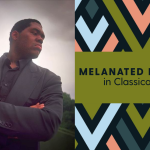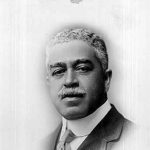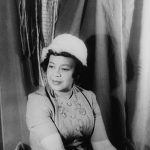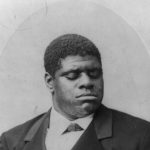MMCM S4E2: The Legacy of a Legend – Shirley Verrett
“Mon coeur s’ouvre á ta voix,” from Samson et Dalila by Saint-Saëns, performed by Shirley Verrett
“Vissi da’rte,” from Tosca by Pucinni, performed by Shirley Verret
“Give Me Jesus,” performed by Shirley Verrett
Angela Brown (00:00): Before we get started with this episode, we wanted to thank our listeners for your amazing support of this podcast. We can’t wait to bring you future episodes, but we need your support. Just go to givebutter.com/melanatedmoments to help share more stories of exceptional Black artists with thousands of listeners across the US and around the world. Joshua Thompson (00:27): And if you’d like more information on each episode, go to our website or follow us on social media. Angela Brown (00:33): Follow my foundation on Facebook @morningbrown or on the web at morningbrown.org Joshua Thompson (00:41): And follow me Joshua Thompson on Instagram as @sockJoplin. Music Plays (00:45): [MMCM Theme] Angela Brown (01:01): Hey, everybody and welcome back to another episode of Melanated Moments in Classical Music. I’m Angela Brown. Joshua Thompson (01:09): And I’m Joshua Thompson. Angela, we are all wondering, who do you have on deck for us today? Angela Brown (01:17): Joshua, I have a regal, elegant woman who trailblazed the operatic world, not only as a mezzo-soprano, but she also was able to switch to soprano rep later in her career and was still killing the game. She forged her career during the turbulent civil rights era. It was no easy feat to become who she became, but she persevered. Joshua Thompson (01:48): Oh wow. So, it sounds like she is a true vocal and social phenom. Angela Brown (01:54): Oh yes, Mr. Joshua! Her name is Shirley Verrett. I had the opportunity to meet and work with, uh, Ms. Verrett at Oakwood University in Huntsville, Alabama. And she was a very kind and gracious woman. Uh, she was giving me extra time to talk about the career and its twists and turns, and I’ll never forget how she poured her wisdom into me. Joshua Thompson (02:21): Oh man. That sounds so cool! You study and meet everyone, and this just sounds so intriguing. So please tell our listeners more about the wonderful Shirley Verrett. Angela Brown (02:33): Well, let me tell you. Miss Verrett was born May 31st, 1931, and she died November 5th, 2010. She was an American operatic soprano who successfully transitioned into soprano roles from being a mezzo. And that’s almost unheard of, you know, and there’s another very famous mezzo soprano that we will probably feature on Melanated Moments in Classical Music at another time that did the same thing because normally the soprano voice will go down. It would be, you know, the, the difference the soprano voice will go to the mezzo. But honey, these sisters went from mezzo to soprano. They were probably already sopranos anyway. Joshua Thompson (03:17): Flipping the vocal script. They that’s what they do. Angela Brown (03:19): Yeah. Miss Verrett was born into an African American family of devout seventh day Adventists in New Orleans, Louisiana. Now Verrett was raised in Los Angeles, California, where she sang in church and showed early musical abilities, but initially a singing career was frowned upon by her family. Okay. Later Verrett went on to study at the Julliard school in New York and in 1961, she won the Metropolitan Opera National Council auditions. She appeared in the first concert ever televised from the Lincoln Center in 1960, and also appeared that year in the first of Leonard Bernstein’s young people’s concerts. Okay. And that were televised from that venue and that venue we now know as Avery Fisher Hall. She made her debut at the Metropolitan Opera in 1968 with Carmen and at La Scala in 1969 in Samson and Delilah. Here, we will hear her sing “Mon coeur s’ouvre a ta voix” from Samson and Delilah. Music Plays (04:35): [Shirley Verrett singing “Mon coeur s’ouvre a ta voix” from Samson and Delilah] Joshua Thompson (07:43): Yes, yes, yes. I’ve almost like run that back. This, uh, this is so classically French. It’s like stereotypical Saint-Saëns. Oh my goodness. Okay. So the instrumentation is gorgeous. It’s just super flowery. I love voice is, is it is. And, and, and her voice has the strength of that lush and luxuriousness, but it’s not forced. And it fits right in the pocket. I mean, there’s so much control it’s full bodied and still nuanced. She’s gorgeous. Angela Brown (08:15): Her voice is like a hot steaming cup of chocolat chaud from Ladurée Patisserie in, uh, France. I mean, it is gorgeous. It is delicious. And, um, knowing the story of Samson and Delilah, how could Samson resist a Shirley Verrett singing to him? Yeah, honey, he cut off all his hair. Do you hear me? Unison (08:40): [Laughter] Joshua Thompson (08:43): This is, you know, this is nice. I have to say I, I’m not wildly intimately familiar with the entire work of Samson and Delilah or Miss Verrett, but, uh, I’m about to be. That was, that was great. I’m gonna have to run this one back a little bit later on today ’cause that’s just, I I’m serious. It was really sublime. I don’t know how else to put it. That’s just gorgeous. Angela Brown (09:05): You can hear her voice has that cream and that depth at the bottom in the middle. But those high notes are shimmering, piercing, beautiful, spinning. And you’re like, she was a mezzo? But check it, check it. Some of her other mezzo roles, which are high mezzo roles, uh, were that she premiered at the Met, um, were Verdi’s Ulrica in Un Ballo in Maschera, Amneris in Aida, Eboli in Don Carlo, and Azucena in Il Trovatore. So all of those mezzo roles really were pushing the soprano envelope. But, in the beginning of the late 1970s, she began to tackle some soprano roles, which I don’t think she was tackling too hard, honey, ’cause this sister had it. And some of those roles were Lady McBeth in McBeth, Madame Lidoine in Dialogues of the Carmelites, Norma, Aida, and her Tosca, which is the next we will hear was televised on PBS on “Live from the Met.” And she also made her Broadway debut in the Tony award winning revival of Rogers and Hammerstein’s carousel at Lincoln Center’s, Vivian Beaumont Theater playing the role of Netty Fowler. So, what we find is a lot of operatic singers later on in their careers, they want to do some of the musical theater pieces that were written more for a classically trained voice and Netty Fowler in, uh, Carousel is one of those roles. But before we get any further, listen, listen to a little “Vissi d’Arte” when Miss Verrett changed from a mezzo to a soprano. Music Plays (11:02): [Shirley Verrett singing “Vissi d’Arte”] Joshua Thompson (14:39): That so nice, like so nice. Um, man, I’m so glad you’re bringing her up today. Cause I’m like, whoa, now I know what I’m gonna be listening to. There’s, there’s something about this where the tone of her voice and the cadence of it, it’s so perfectly matched and aligned with her diction, the enunciation and articulation of the linguistic phrase. I mean it’s flawless. It makes it even without knowing the language, you, you hear exactly what she’s saying and, and that’s the phrase of the music she’s singing the phrase like literally as a, as, as a verbal language. Angela Brown (15:19): She’s singing through the vowels because that’s one thing I remember. It was funny. I mean, you, you, you mentioned that, um, and you not even knowing, um, when I had my lesson, when I had my lesson with her, one of the things that I took from her was that you always sing pure vowels and in singing pure vowels, or as I tell my student tall vowels, you are in the groove, you are staying in your lane. And that is one reason why she was, uh, able to traverse from a mezzo soprano to a soprano cause she was already a high mezzo. So she just had to stay in her lane through the vowel sounds all the way up to her top register. And then of course supporting, but it’s beautiful. She is like a voice lesson every time you listen to her, every time you listen to her. Joshua Thompson (16:14): She is, it’s just very, I, I mean, I’m not a singer and trust me, y’all, y’all don’t want that. Um, but she’s just, she’s so very open, right? The entire cavity of her instrument, which is her voice from her sinuses to her, you know, to her, vocal cords and everything. Angela Brown (16:32): Its the opened focused sound. You know, and that’s very important. You don’t be open and laid back. You wanna be open and focused. And she shows us that. Joshua Thompson (16:41): I know you have another, another piece for us, but this is something where with the operatic voice, I think is really helpful for like lay people like myself, we don’t sing, we don’t know these things the way that she sings makes the study of opera, um, it makes it very relatable and accessible. Listening to her, I’m like, okay, I get it. I may not do opera, but I know exactly what it sounds like when it’s done well and it’s not done intimidating, in an intimidating fashion. It’s just, she just lays it out there. She, she, a bad little lady I’m gonna tell you. Angela Brown (17:13): She’s just singing. And in 1996, Verrett joined the faculty of the University of Michigan School of Music, Theater and Dance as a professor of voice and the James Earl Jones distinguished university professor of voice. Okay. In 2003, Shirley Verrett published a memoir, which I am holding in my hand now called “I Never Walked Alone” in which she spoke, frankly, about the racism she encountered as a Black person in the American classical music world. One story she recounts is when the conductor Leopold Stokowski, invited her to sing with the Houston Symphony in the early 1960s. He had to rescind his invitation when the orchestra board refused to accept a Black soloist. But, to Stokowski’s credit, he later made amends by giving her a prestigious date with the much better known Philadelphia Orchestra. So it just goes to show you, sometimes you are put in situations where you don’t like it, but you smile, you grin and bear it. And before, you know, you are being elevated to another stratosphere, another point, another wrung on the ladder, because what they thought was gonna be your downfall ended up being your up, your come ups, you know? Joshua Thompson (18:54): Absolutely. And, and it’s, it’s defamed Leopold, right? And so it’s, you know, also, uh, a nice little reveal in allyship and advocation looks many different ways, right. Um, and so Houston might not have been the place for either of them to really reach this zenith and to be elevated. Angela Brown (19:14): Exactly. At that time, at that time. Joshua Thompson (19:16): For sure. For sure. Angela Brown (19:18): Now, Ms. Verrett died in Ann Arbor, Michigan at age 79 on November 5th, 2010 from heart failure due to an undisclosed illness. She was survived by our husband and their adopted daughter, Francesca and their granddaughter. The next song I would like for you to listen to from Miss Verrett is one that I know gave her solace and, um, comfort, uh, not only to her, but to her family in times of discouragement. Um, and that is “give me Jesus, whatever may be coming my way. Give me Jesus.” Music Plays (20:00): [Shirley Verrett singing “Give Me Jesus”] Joshua Thompson (24:07): Angela, how nice I, I love how you put this piece in this part of the episode, ’cause you were, you were telling us about the, the autobiography where she’s talking about barriers, struggles, personal and professional. Um, and this serves as that wonderful, like back to the roots, spiritual salve over all that. Not just for her, but we for, for all of us. Right? Angela Brown (24:31): Exactly. Joshua Thompson (24:32): Regardless of what you believe. Angela Brown (24:33): Who has us? Yeah. You know, one of the things that I wanted to, um, say before we end this, uh, episode on Ms. Verrett is a quote that she gave at a, uh, gala banquet honoring some of her colleagues. She says, “I’m always so happy when I can speak to young people because I remember those who were kind to me that didn’t need to be. The first reason I came tonight was for the honorees because I needed to say this. The second reason I came was for you, the youth. These great people here were the trailblazers for me. I hope in my own way, I did something to help your generation and that you will help the next, this is the way it’s supposed to be. Yes. You just keep passing that baton on.” And I have to say, Ms. Verrett did that. She gave of her heart. She gave of her knowledge to others. And so I am just in awe of Shirley Verrett. Joshua Thompson (25:51): And, and how can you not be, I mean, this is a very legacy building and selflessness is a very futurist practice, right? ‘Cause she saw you and talked to you when you were starting and she’s passing on. I think it’s, it’s wonderful. And Angela, uh, I don’t know why I’m surprised, but you always come to this show, bringing some absolute heavy hitters and heavy hitters with the heart. So thank you for that one. Angela Brown (26:19): Josh, It’s not hard to serve our public with the very best that melanated music-dom has to offer when the subject matter is someone who is always excellent, who was always excellent, and willing to share their heart with the world. Thank you, Shirley Verrett, for touching the ears and hearts of listeners for years and beyond. And with that note, I’m Angela Brown. Joshua Thompson (26:46): And I’m Joshua Thompson. Unison (26:48): And this has been Melanated Moments in Classical Music. Angela Brown (26:59): Melanated Moments in Classical Music is a production of Classical Music Indy. Our producer is Ezra Bakker Trupiano. Our theme music was composed by Laura Karpman. Joshua Thompson (27:12): Melanated Moments in Classical Music is made possible in part by the Indiana Arts Commission, a state agency, and the National Endowment for the Arts, a federal agency. Additional support comes from the Indy Arts Council and the City of Indianapolis. Angela Brown (27:28): Our podcast partners are Morning Brown, Inc. and Symphony Tacoma.
[/su_tab] [su_tab title=”Related Blog Posts” disabled=”no” anchor=”” url=”” target=”blank” class=””]LOCAL CLASSICAL – MELANATED MOMENTS SEASON SIX
As we continue celebrating Black Music Month, this week’s playlist will feature music and artists discussed during the latest season of Melanated Moments in Classical Music. All of season six was recently released and featured vibrant discussions about artists such as Scott Joplin, Hazel Scott, Joseph Bologne, and Kenneth Overton, among others.
LOCAL CLASSICAL – BLACK MUSIC MONTH
In this week’s playlist, we celebrate Black Music Month which takes place in June. It was created by President Jimmy Carter in 1979 to honor and celebrate Black artists’ contributions to music. We’ll be honoring the late Herman Whitfield III, an Indianapolis native who was a gifted pianist and composer. We’ll also hear performances of artists who have been featured in season four of Classical Music Indy’s podcast, Melanated Moments in Classical Music.
LOCAL CLASSICAL – MELANATED MOMENTS
In this week’s Black History Month playlist, we bring you recordings by composers, performers, and artists who have been highlighted in our podcast, Melanated Moments in Classical Music. Melanated Moments is the ward-winning podcast from Classical Music Indy that shines a spotlight on musical works composed by, for, and about Black people.
LOCAL CLASSICAL – HOST OKARA IMANI
Hey, Starshine! This is Okara Imani, Media Production Fellow for Classical Music Indy, and your guide to The “I” in Classical Music. I’m here to highlight the cultural and social intersections of the classical art form, beyond the Classical Period and beyond the constructs of Euro-centric high society origins.
Ric’key Pageot: Inspiring a Moment to Learn, Acknowledge, and Respect
Ric’key Pageot: Inspiring a Mo …
Ignatius Sancho: Composing the Hypocrisy of Colonialism & Convention
Ignatius Sancho: Composing the …
NEW CLASSICAL – DR. BILL BANFIELD
This week we bring you the music of Dr. Bill Banfield. Dr. Banfield is an award-winning composer whose symphonies, operas, chamber works have been performed and recorded by major symphonies across the country. Few have a wider, performed professional composing output, that has had public concert performances, reviews, radio, recordings of some 12 symphonies, 7 opera, 9 concerti, chamber, jazz, and popular forms. This alone making Dr. Banfield one of the most performed, recorded composers of his generation. In 2010 and 2016, Dr. Banfield served as a Pulitzer Prize judge in American music.
#AmplifyMelanatedVoices
Classical Music Indy stands with our Black community. We are here to listen, learn, and lend our support. We believe that classical music is powerful; that it evokes a range of human emotions and creative expression.
Angela Brown Brings her Unbridled Zeal to a New Podcast.
Angela Brown brings her unbrid …
Local Classical – Angela Brown
We continue our Black History Month programming this week with our featured artist, soprano Angela Brown. Born in Indianapolis, Brown has led a world-renowned career as a vocal soloist. Her highly successful Metropolitan Opera debut in the title role of Aida captured instant attention from international print and broadcast media and catapulted Angela onto the world’s prestigious opera and symphonic stages.
Highlighting our Female Performers
Classical Music Indy employs a diverse range of musicians for our events around Indianapolis. In 2016 we hired 95 musicians. Classical Music Indy has dedicated our blog articles to outstanding women musicians this month. We’ve shared about great women music educators in America and about under-recognized women musicians throughout history. This week, we take a look at a few of Classical Music Indy’s top performers – women who are doing great work here and now in the city of Indianapolis. Read below about these incredibly talented musicians, and hopefully you’ll hear them at one of our events in the near future!








































